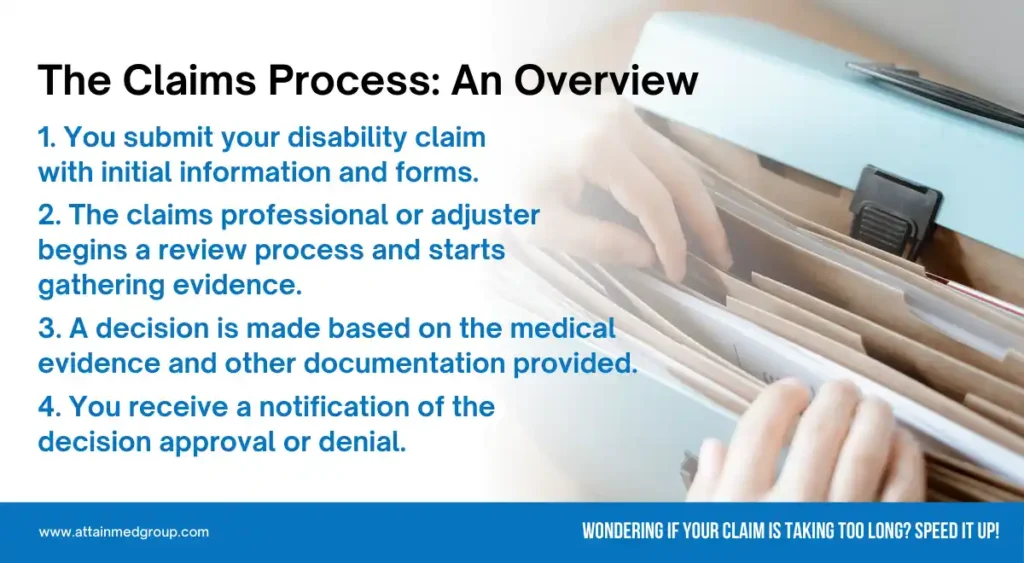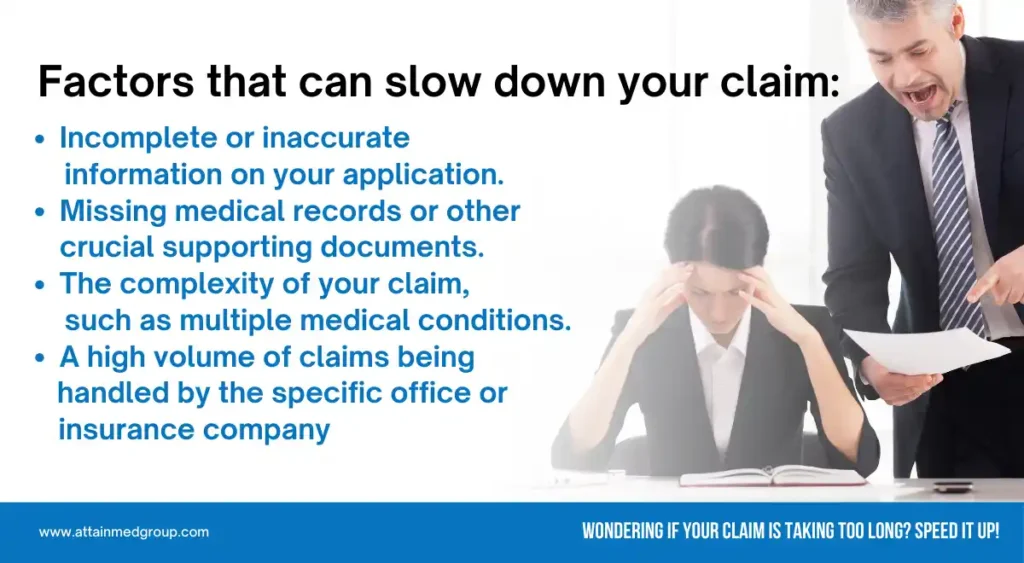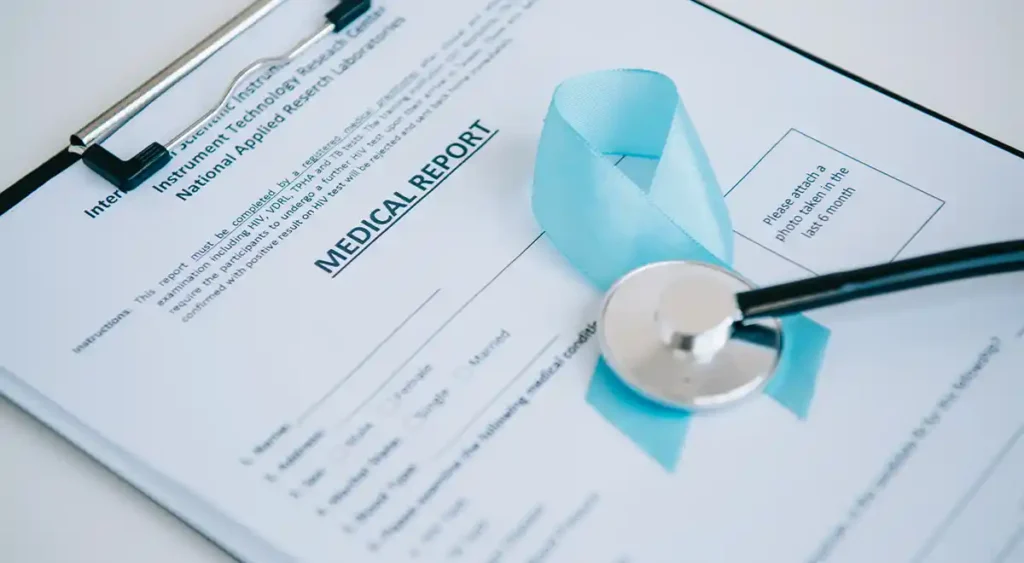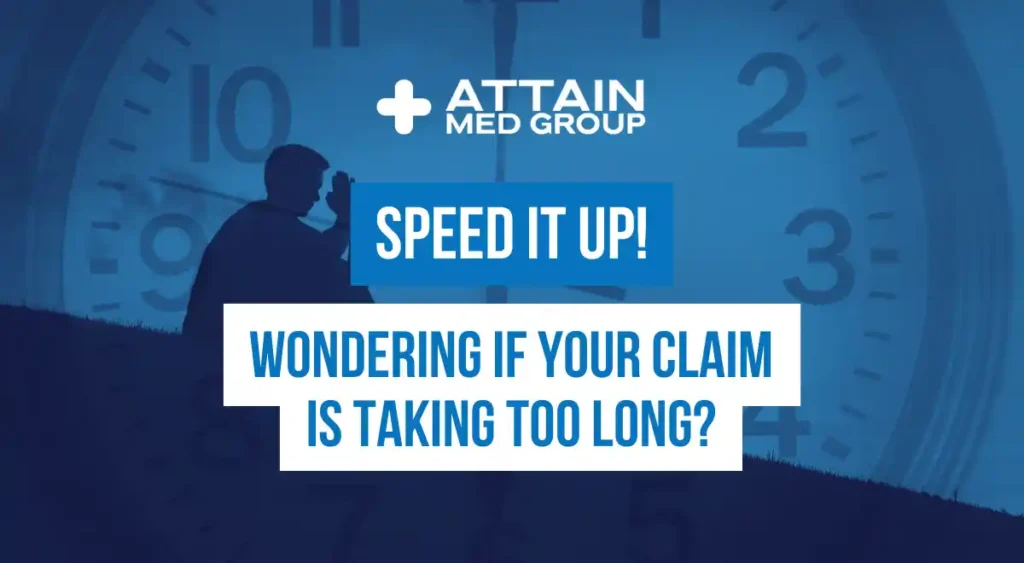Are you feeling frustrated while waiting for a decision on your claim? You are not alone. Many people find themselves wondering if their claim is taking too long, whether it’s for VA benefits, a personal injury case, or long term disability.
Understanding the claim process and how complete medical documentation can accelerate it is vital to getting the benefits you deserve. The right medical evidence can make a significant difference in the outcome and timing. Let’s explore how your medical records can help speed things up.
The Claims Process: An Overview
Before diving into the specifics of medical records, it helps to understand the general steps of the claims process. While details can vary between insurance companies and government agencies, most follow a similar path. The process involves several stages from submission to a final decision.
Typically, the claims processing journey looks like this:

Each of these steps can take weeks or even months, especially if information is missing. The time spent in the evidence-gathering phase is often the longest. This is where you have the most power to influence the timeline.
How Long Should a Claim Take?
Many organizations, like the VA, aim to process claims within a few months, but this is just a target. The actual turnaround time can be much different. Some disability claims are resolved quickly, while complex cases can drag on for over a year.
Published averages for va claims processing can be misleading because they group simple and highly complex cases together. Your wait times depend heavily on specific factors related to your situation. The workload at your local regional office and the nature of your medical condition both play a large role.
Factors That Can Slow Down Your Claim
Several issues can cause significant processing delays with your claim. Being aware of these potential delays can help you prepare a stronger case from the start. A few common problems frequently slow down the review process.
Here are some of the primary factors that influence how long the process takes:

You have direct control over the quality and completeness of the information you provide. Taking proactive steps to build a solid file of medical evidence is the best way to avoid unnecessary delays. This preparation helps the claims adjusters do their job more efficiently.
The Power of Medical Documentation
Strong medical evidence is the foundation of any successful disability claim. It is not just about having medical records; it is about having the right records presented clearly. Proper medical documentation can dramatically accelerate your claim in several ways.
1. Establishes a Clear Timeline
Your medical history creates a timeline that connects your condition to a specific event or period, such as military service or a personal injury. For a disability claim, this connection is essential for the insurance company or agency to approve benefits. Clear medical records establish this link beyond doubt.
2. Proves Your Current Medical Condition
Recent medical documentation that shows an ongoing treatment plan or persistent symptoms helps reviewers understand your current health status. This is critical for determining the severity of your disability. Without current records, they might assume your condition has improved.
3. Shows the Impact on Your Life
Detailed medical reports from a healthcare provider describing how your medical condition affects your daily life are very persuasive. This information helps the reviewer accurately assess your limitations. A well-documented file can lead to a faster and more appropriate decision on your disability benefits.

Types of Medical Documentation That Can Help
Not all medical data is created equal in the eyes of a claims adjuster. Certain documents carry more weight and provide the specific information needed for a decision. Gathering these key pieces of medical evidence for your claim file is a crucial step.
Here are some of the most important documents to include:
Service or Incident-Related Medical Records
For VA claims, your service medical records are the most important evidence. They can provide direct proof of injuries or illnesses that occurred during your service. For a personal injury or malpractice case, these are the records from immediately after the incident.
If you are missing records, you should start the process of requesting them as soon as possible. Providing them yourself is much faster than waiting for the claims professional to track them down. This forms the foundation of your evidence claim.
Post-Service or Ongoing Treatment Records
These records show how your condition has progressed over time. They are especially important if there is a long gap between the initial event and when you’re filing your claim. A consistent medical history demonstrates the long term nature of your condition.
Regular check-ups and adherence to a treatment plan show the parties involved that you are actively managing your health. This continuity of care can significantly strengthen long term disability claims. It paints a picture of a persistent medical condition.
Official Medical Examinations
For VA claims or other disability claims, you may be required to attend a medical examination scheduled by the agency or insurance company. These exams are crucial because they provide an official, third-party assessment of your condition. Always attend these appointments.
Skipping a scheduled exam can seriously delay your claim or even result in a denial. Prepare for the exam by reviewing your medical history and being ready to speak openly about your symptoms and limitations. These exams are a key part of the medical record review.
Private Doctor’s Statements
A detailed statement from your own healthcare provider can provide powerful insight. This should describe your diagnosis, prognosis, and how your disability impacts your ability to work and perform daily activities. It is an expert opinion that can sway the decision.
Ask your doctor to be specific and, if relevant, to comment on the connection between your condition and a specific event. These statements from trusted medical professionals carry significant weight with claims adjusters. They are a valuable addition to your medical evidence.
Diagnostic Test Results
Objective evidence like X-rays, MRIs, blood tests, and other diagnostic results offer concrete proof of your medical condition. This type of medical data is hard to dispute. It validates your subjective complaints with scientific findings.
Always request and keep copies of your test results. Make sure they are included with your submitted claim to provide a complete picture of your health. A comprehensive review of medical records should always include this objective information.
Witness Statements
Do not overlook the power of personal accounts. Witness statements from family, friends, or colleagues can add important context to your medical evidence. They can describe the changes they have observed in you since your injury or illness began.
These letters help illustrate the real-world impact of your condition. They can corroborate the information in your medical records and your own statements. Witness statements often provide details that medical professionals might not see during an office visit.

Tips for Gathering Effective Medical Documentation
Knowing what documents to gather is the first step. The next is to collect them efficiently and organize them effectively. Staying proactive during this phase can save time and reduce stress.
- Start early. Begin collecting records as soon as you decide to file a claim to avoid last-minute scrambling.
- Be thorough. Get copies of your complete medical history related to the condition, not just recent reports.
- Stay organized. Keep your records in chronological order and create digital copies for easy access and submission.
- Be proactive. If a healthcare provider is slow to respond, follow up politely but persistently.
- Communicate clearly. Explain to your medical professionals why you need detailed records for your claim.
Common Mistakes to Avoid
Even with good intentions, simple mistakes can cause significant processing delays. Avoiding these common pitfalls can keep your claim on track. Awareness is the first step toward a smoother claim process.
One major error is downplaying symptoms during a medical examination. Be honest and thorough about how your condition affects you. Another issue is inconsistent information across different documents, which can raise red flags for claims adjusters.
Finally, be mindful of what you post on social media. Insurance providers sometimes check public profiles for activity that may contradict your stated limitations. Keep your accounts private or avoid posting anything that could be misinterpreted.
When to Seek Professional Help
Sometimes, a claim is too complicated to handle on your own. This is especially true for complex cases involving a medical malpractice claim or a denied long term disability claim. Knowing when to ask for help is a strength.
If you face repeated denials or feel overwhelmed, you may want to hire experienced help. A claims professional, malpractice attorney, or a firm specializing in medical records consulting can provide expert guidance. They understand the system and can help you build the strongest possible case.
How to Submit Your Medical Documentation
Submitting your documentation correctly is just as important as having it. Each agency or insurance company has its own preferred methods. Following their guidelines prevents your documents from getting lost in the system.
- Use the preferred submission methods, such as a secure online portal or certified mail to your regional office.
- Submit clear copies and always keep the original documents for your records.
- Make sure every page is labeled with your name and claim number.
- Follow up a week or two after submission to confirm that everything was received.
What If You’re Still Facing Delays?
Even with perfect documentation, claims can get stuck due to factors outside your control. If you are facing unreasonable wait times, do not just sit back. There are proactive steps you can take.
Regularly contact the regional office or insurance company for a status update. If your claim has been pending for an unusually long time without movement, you can file a formal inquiry. Working with a case management professional can also help get things moving.
Remember that patience is important, but persistence pays off. Your right to a timely decision is part of the process. Stay engaged and continue to advocate for yourself.

Conclusion
Wondering if your claim is taking too long? The key takeaways are that understanding the process and providing strong medical documentation can dramatically accelerate it. By submitting thorough and relevant medical evidence, you can shorten the review process and avoid common delays.
The path to a successful claim involves being proactive, organized, and persistent. Success stories often begin with a well-prepared and documented claim. With the right approach, you can manage the claims process more efficiently and get the benefits you have earned.
Do not let processing delays discourage you. Stay informed, stay prepared, and keep moving forward on your path to a decision. Your efforts to build a strong case with solid medical documentation will make all the difference.

